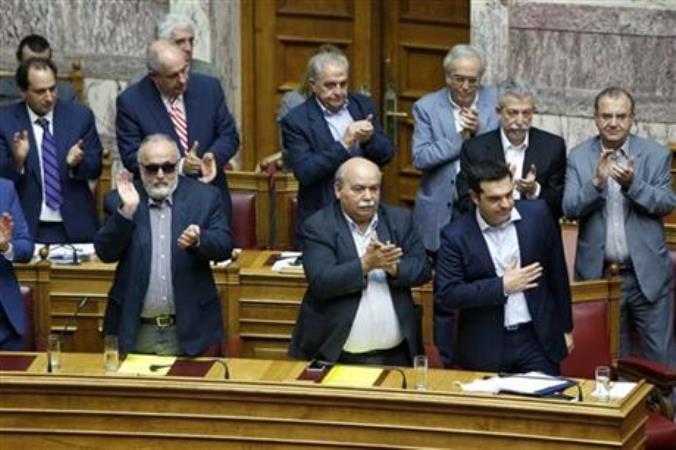Asked directly, for the second time, whether Greece will pay up Tuesday, Varoufakis replies: "We are owed money by one part of the troika and we owe money to another part of the troika? Why don't they sort themselves out and transfer money from one pocket ... to the other?"
Meanwhile, the European Central Bank has announced it is maintaining emergency credit to Greek banks at its current level.
The decision keeps a key financial lifeline open but does not provide further credit to Greece's banks, which are seeing deposits drain away as anxious Greeks withdraw savings.
The ECB said it was working closely with the Bank of Greece to maintain financial stability and added it could reconsider the decision on credit levels.
ECB head Mario Draghi said "we continue to work closely with the Bank of Greece and we strongly endorse the commitment of Member States in pledging to take action to address the fragilities of euro-area economies."
And France's prime minister is urging Greece and other nations to do whatever they can to keep Greece in the 19-nation bloc that uses the euro currency.
French Prime Minister Manuel Valls said Sunday that "we don't know — none of us — the consequences of an exit from the eurozone, either on the political or economic front. We must do everything so that Greece stays in the eurozone." He was speaking on France's i-Tele TV.
Valls added that "means respecting Greece and democracy, but it's also about respecting European rules. So Greece needs to come back to the negotiating table."
Greek Prime Minister Alexis Tsipras' call for a national referendum on creditors' demands has thrown Greece's negotiations with its international lenders into turmoil.
And Germany's Foreign Ministry is advising travelers to Greece to ensure they have enough cash on them before they depart.
An updated version of the ministry's travel advice issued Sunday noted that people seeking to withdraw cash in Greece could face "significant waits" and possible shortages at cash machines.
Worried Greeks were lining up at ATM machines on Sunday, the day after the Prime Minister Alexis Tsipras called for a referendum on creditors' financial proposals in return for rescue loans and creditors refused to extend Greece's international bailout beyond Tuesday.
While some machines in Greece were running out of cash, others were being replenished. Another top Greek financial official urged Greeks on Sunday to remain calm and not withdraw all their savings.

